The Beloved
The Beloved
The Life, Work and Teachings of Avatar Meher Baba
By Naosherwan Anzar
The ascent to the hill at Meherabad is not too cumbersome. Large mounds of small hillocks seem to spread out in waves, and underfoot the trail is a slew of sharp-edged rocks. For miles around there is ethereal silence, broken by the rustling of a solitary tree edging itself over a craggy rock. I could see from lower Meherabad the white dome of the Tomb. It seemed to emerge like the sun from the line of horizon. The Tomb was built in 1927 over a site where Avatar Meher Baba had sat in seclusion in the early days at Meherabad. (It was then called the dome because of its unique architecture.) The interior was painted with murals by the Swiss artist Helen Dahm in 1937. I had come immediately after I got the news. As I walked up the hill, I remembered. He had looked at me with compassion. I had clutched his feet and embraced his body. Without any apparent reason my eyes had welled up tears, and before I could step out of the room, Meher Baba had pointed to his wrist and said, “My time has come,” and then making a cross with his fingers he had remarked, “This is my crucifixion.” That was my last meeting with him in that little corner room at Meherazad in Ahmednagar District, India, in the evening of December 23, 1968. Forty days later I received the telegram from Meher Baba’s secretary Adi K. Irani:
AVATAR MEHER BABA DROPPED HIS PHYSICAL BODY AT TWELVE NOON 31ST JANUARY AT MEHERAZAD TO LIVE ETERNALLY IN THE HEARTS OF HIS LOVERS
That very day in the evening his disciples — the mandali — had carried his body from Meherazad to be placed in the crypt of the Tomb at Meherabad. Meher Baba had hinted to them on that last day, the morning of January 31, that seven days later, “he would be 100 per cent free.” Exactly seven days later, at 12:15 p.m. on Friday, February 7, 1969, the Beloved was interred amidst the resonant cries of ‘Avatar Meher Baba Ki Jai’ (Hail Avatar Meher Baba).
The Moment of the Avatar
When he was born, they called him Merwan. His other name, Meher Baba, would come many years later. The date was recorded by the Zoroastrian Calendar: Tir Roj, the month of Meher, 1263 Yezdezardi. His parents were Zoroastrians and they were faithful to the tenets of the religion. February 25, 1894, Sunday, 5:00 a.m. The moment of the Avatar. Was there a clue to his birth? A seed, a premonition? Yes, the seed was born forty-one years before. We shall have to go back to 1853 and Khoramshah, a small town near Yazd in Iran. That was the birth of his father, Sheriar Mundegar Irani.
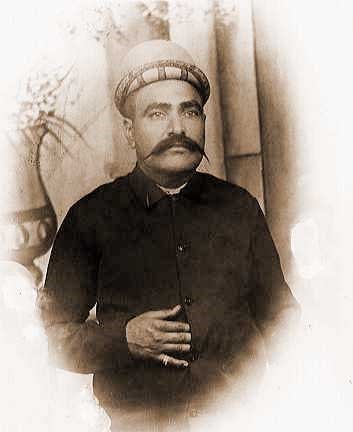
Sheriar Mundegar Irani, Meher Baba's father

Sheriar Mundegar Irani, Meher Baba's father
Right from his birth, Sheriar’s life seemed to have been ordained. The family he was born into had a mystic air. His father Mundegar was the keeper of the Tower of Silence (the place where Zoroastrians place their dead). His mother died when he was only five. There was nobody to look after the child at home. His father would take him to the Tower; the boy watched the prayers and the rituals. The foundation was being laid. One day Sheriar was sitting on the grounds of the 'Tower of Silence,' when he saw a figure running up the cobbled path. As the figure came closer he saw that it was a young and beautiful Irani woman running in fright. In a state of exhaustion she explained that some Mohammedans were chasing her and begged him to save her. Near where he was sitting was an oven (a large urn-like opening in which the relatives of the dead baked their bread), and since it had not been used that day it was cold. He helped the trembling girl into the urn and placed the lid on it. Before long he heard the hoofs of galloping horses and a group of Mohammedan riders came in view and asked him if he had seen any one pass by a few minutes ago. Sheriar replied that he had been there for over an hour, and not a dog had passed by. They felt he was speaking the truth (which indeed he was!) and turning about they galloped off. Sheriar let the woman out of the oven and escorted her home.
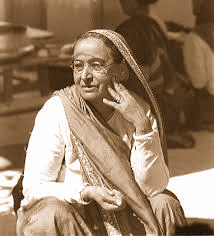
Shireen Irani, Meher Baba's mother

Shireen Irani, Meher Baba's mother
At the age of thirteen, strangely drawn to the life of a mystic, Sheriar left home in search of God. For eight long years he roamed Iran as an itinerant monk. He traveled from place to place on foot, slept wherever he could get shelter and asked for food when hunger compelled him to do so.
Years rolled on. He had not found what he was looking for. Disillusioned, he looked for an escape. His brother Khodadad was about to leave for India. Sheriar decided to join the party. We don't know much about the journey, except that it was long and hazardous. In Bombay Khodadad took up a job. Sheriar too took jobs, but would not keep them long. The unfulfilled search burned inside him and he started traveling around on foot. He went to Karachi, stayed there a month and continued his journey through the barren wastelands of Gujarat and Kutch.
One day while walking through a desert, foot-weary and worn out, Sheriar was overcome by unbearable thirst. He could walk no further and swooned. When he woke up, he saw two men, an aged fakir and a younger man, standing beside him.
They offered him water from their leather bag. One of them said: “Why have you come here? Why should you trouble God by acting foolishly? Now go on your way and you will come across a hut where an old man will give you food to eat. Then proceed in the opposite direction and you will reach a town.” Sheriar raised his head to thank his benefactors, but to his astonishment he found that the two men were not there and for miles around him there was no sign of life. “They are men from God,” he thought. At last, here was a trail. He knelt down on the ground and prayed in gratitude.
The trail went on; there would be other clues, other visitations. Once, walking through the hills, Sheriar met an old man sitting in meditation. He approached the saintly man and saluted him. The old man looked up and said: “What do you want?” “Nothing,” Sheriar answered. It was a strange answer, but the old man was pleased.
Sheriar continued his wanderings. He had not yet found his goal, he had not found God. He tried the hard way now — forty days of continuous meditation without food or sleep. But he couldn't complete the forty days.
Before thirty days were over, strange things had happened. One night from sheer exhaustion he had dropped off to sleep by the side of a river when a voice spoke to him loud and clear: “You are not destined for that which you seek, but the one who will be born to you will achieve it. Rise and return home. Sheriar's racing heart told him it was the voice of God. He would have to do as the voice had commanded. Sheriar started for home. Home was now where his sister Piroja lived — in Poona. Baba’s maternal aunt was also Piroja and she and her husband Rustom loved Baba very dearly.
Piroja was overjoyed. Her long-lost brother had come back. She had adored him and when he left home, it had hurt her. Now the lost sheep had come back. She would have to help him stay back, help him to strike roots. She asked her brother to marry. Sheriar wouldn't agree, marriage was too strong a hold; it made him afraid. Then one day a peculiar thing happened. He was standing near the door of his house; he saw a little girl of five, clutching her slate, pass by. She was dressed in a short frock and her favorite red 'ijar' (loose quarter-length trousers) with a red ribbon at the end of her pigtail. Sheriar pointed at the little girl and said to his sister, “All right, if I marry, I marry her and none else.”
He chuckled at the absurdity of his proposition.
Maybe he had meant it as a joke, to put an end to his sister’s further coaxing. He was stunned when his sister took him up on it. Piroja knew her brother would never go back on his word and promptly went to see Golendoon, the mother of that child whose name was Shireen. She narrated the incident of that morning and begged her “on her knees” to save her brother and her happiness by consenting to give her five-year-old daughter Shireen in marriage to the thirty-year-old Sheriar. Golendoon’s husband raged and raved when he came home and heard what his wife had done, but word had been given and it was sacrosanct.
The next nine years was a period of readjustment: to living in society, to setting up house and to waiting for his little bride to grow up. Shireen grew up. When she was fourteen, they were married. At fifteen, her first child was born. The boy was named Jamshed.
Sheriar was a devoted husband and a kind father. Although in his earlier days he had renounced all material goods, he now decided to set up a toddy shop to maintain his family. The business was fairly successful and Sheriar even bought a small house out of his savings. The neighbors used to call it the “Pumpkin House” because at one side of the entrance there was a big round stone. Later they would buy a larger house (this was marked as “the house with the well’).
Sheriar had implicit faith in the goodness of his friends and fellow-beings. This would cause him a lot of heartache in his old age. He was getting infirm; the shop duties were heavy. He took in a young man called Muluk Sheriar Irani as his partner. The partner would look after the business in the shop, while Sheriar attended to the auction of toddy tree lots which were purchased for the season. Gradually he handed over this part of the business as well to Muluk, and later all that was required of him was his signature.
One evening Muluk invited Sheriar to his house for dinner and served him with his favorite delectable Persian dishes. It was an evening of camaraderie and as Sheriar was about to leave, Muluk placed “an official looking” typed sheet of paper before him and asked him to sign it saying that it was another toddy lot deal to be procured. Sheriar signed on the dotted line.
What he did not know was that the document he had put his name on declared that he had “unconditionally handed over as gift to Muluk his share and part of the business.” Muluk soon staked his claim. The issue went before the courts.
The total burden of looking after the legal matters fell on Shireen. She had to fight a lone battle — against the sharks and her husband's gullibility. Sheriar would say, “We are not the losers, what have we to lose? It is poor Muluk himself. He has gained nothing and naturally has to suffer in many lives to come, just think of that! Can you see now why I am sorry for him? The law of cause and effect, of sow and reap, is as inexorable as that — the laws of God are finer than the hair of our head.” Shireen wouldn’t understand this. “But who is going to see that?” she would say. “I will be dead, and if I see him in the next life I would not know it is Muluk! Besides, what good is his suffering going to do to me? We have lost all the business, and whatever is in the bank (in cash and jewelery) for our children and their future will all be lost in court expenses!”
At seventy Sheriar would go to court with the name of ‘Yazdan’ on his lips, till one day the court finally ruled in Muluk’s favor. The judge stated that Sheriar was innocent and that he had been duped, but the fact remained that he had signed the document.
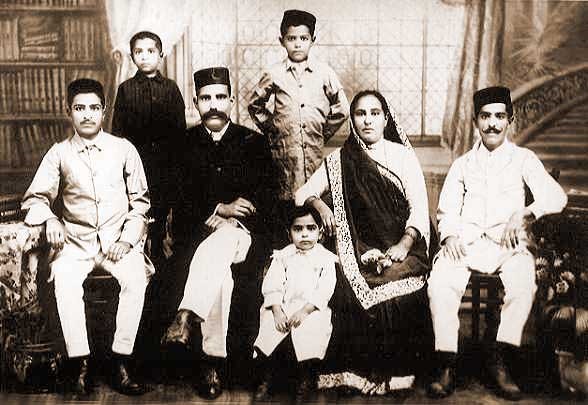
Merwan in 1917. From left to right, Merwan, Behram, Khodadad, Jal, Adi Jr., Shireen and Jamshed

Merwan in 1917. From left to right, Merwan, Behram, Khodadad, Jal, Adi Jr., Shireen and Jamshed
When it was all over, Sheriar sent a message to Muluk saying, “I forgive you fully. Some day you may want to ask my forgiveness and would not be able to do so, for I am an old man and would be dead by then. So remember you will not need my forgiveness, for I have forgiven you completely. It is now simply a matter between you and God.” In 1960 when Meher Baba was at Guruprasad in Poona, Muluk's wife came on one of the darshan days and falling at his feet she cried and asked for forgiveness. She said that her husband had been bedridden for some time before his death and had repeatedly asked for Baba’s forgiveness. Her husband was dead, and now she had come to do what his soul had yearned for. Baba lovingly caressed her tear-stained face, embraced her and told her not to worry and asked her to forget the episode. All was forgiven.
Merwan's Boyhood
There were no miracles, no signs that heralded Merwan’s nativity, although, before his birth, Shireen had an unusual dream. She had dreamt of being led into a wide open area where she was surrounded by a large number of alien faces, a multitude that extended on all sides to the horizon. The faces stared at her steadily and expectantly till she woke up and narrated the dream to those around her. The dream was interpreted as symbolizing the birth of one who would be loved and esteemed by large multitudes.
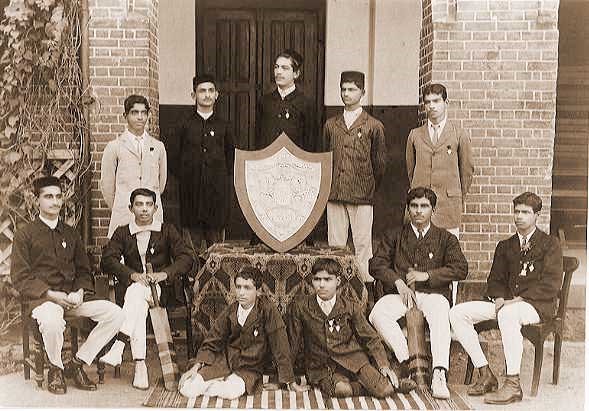
Merwan with his school cricket team, Poona, 1907. Merwan is seated first on the floor from left

Merwan with his school cricket team, Poona, 1907. Merwan is seated first on the floor from left
Merwan spent his childhood at 816, Butler Moholla, in Poona, and had a happy childhood. Shireen called Merwan her “most beautiful child.” He had the most lovely golden hair which she did not have the heart to cut, and Merwan spotted curls down to his shoulders till he was nearly five. Shireen had an ambition that when Merwan was older she would send him to England and Europe for further studies. At the age of five, he was admitted to the Dastur School and later studied for another five years at Camp Government English School. Shireen remembered in the later years, “Merwan was very active and mischievous from the time he was able to toddle, and would walk out of the house when my attention was distracted. This often compelled me, when I was especially busy with housework, or had to go for my bath and there was no one in the house to look after him, to tie one end of my sari to his waist and the other to the bedstead. Even then I could not always keep him out of mischief. Once I had left him playing on the floor. Returning to the room some minutes later I was horrified to see him playing merrily with a big black snake. With a piercing scream I rushed forward, but the snake slipped quickly out of the house and was never seen again.” He matriculated in 1911 from the St. Vincent's High School. He was seventeen then. He had a deep interest in literature, especially poetry. He liked Shakespeare, Shelley and Wordsworth and was particularly attracted to the poetry of Shams al-Din, known as Hafiz. He wrote too, mainly poems in Gujarati, Urdu, Hindustani and Persian which were published in Sanj Vartman, one of the popular Gujarati papers of Bombay. He wrote under the pen name of ‘Huma.’ Merwan was very alert, a fast walker and an equally fast sprinter. Because of his sporting qualities, his friends called him ‘Electricity.’ When Merwan was twelve years of age, his father mentioned to him having witnessed an unusual phenomenon at night at the Tower of Silence. Merwan too decided to go there. His friend Behli J. Irani accompanied him one night at 11:30, without even a lantern. Behli was scared and wanted to retrace his steps, but Merwan boldly insisted on going to the very place where the corpses were placed. No sooner did they ascend the flight of stairs when they saw a tall man, in a white robe and a long white beard, standing against the main door with hands outstretched. As the two of them approached the figure, it disappeared and the boys returned home after this strange and exciting adventure.
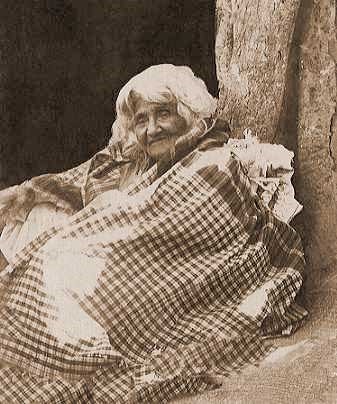
Hazrat Babajan

Hazrat Babajan
It was a morning in May. The year was 1913. Merwan had been going to college for two years. On this day he was on his way to college on a bicycle down Rao Saheb Kedari Road. Then he saw an old woman sitting under a neem tree. She beckoned to him. He stopped and got off his bicycle. When he went near her she embraced him. It was like being drawn to her as “steel to a magnet.” The old woman (they said she was 122 years old) was none other than Hazrat Babajan, a Perfect Master. The magnet had held the steel. Merwan called on her every night and after several months, one night in January 1914, she kissed him on the forehead between the eyebrows. The kiss was the key: in a flash he found the infinite bliss of self-realisation. Meher Baba explained the incident later: “At the time Babajan gave me the nirvikalp (inconceptual) experience of my own reality, the illusory physical, subtle and mental bodies — mind, worlds, and one and all created things — ceased to exist for me even as illusion. Then I began to see that only I and nothing else existed.” This was the first unique experience of his life. During the first three days Merwan was unconscious of everybody and everything, although his body functioned normally. He lay in bed with vacant eyes and this worried Shireen. She was afraid her son was going mad and, in panic, she rushed to Babajan. Babajan told her that Merwan was not mad but that he was intended to shake the world into wakefulness. He himself described this later:
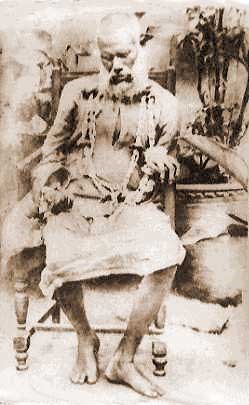
Tajjudin Baba

Tajjudin Baba
Nine months after my self-realisation, I began to be somewhat conscious of my surroundings. Life returned to my vacant eyes. Although I would not sleep, I began to eat small quantities of food. . . When after the kiss from Babajan I knew that I was like the Ocean, I did not want to come back to the ordinary 'drop' consciousness from that Blissful State where I alone was. But despite my resistance the five Perfect Masters kept 'pulling me down' to ordinary consciousness for my destined manifestation as Avatar; and in this excruciating agony I went through this 'tussle'. I used to knock my forehead on a stone in my room at home, during the nine months before Upasni Maharaj brought me down to normal consciousness
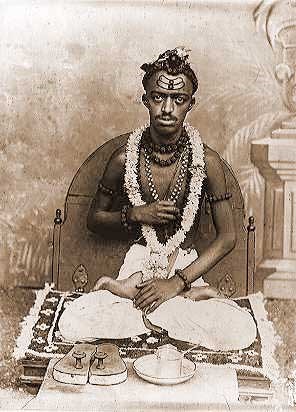
Narayan Maharaj

Narayan Maharaj
"Once I left Poona by rail for Raichur (about 300 miles from Poona), but after traveling for only 34 miles I felt the urge to leave the train at Kedgaon. There for the first time I came in physical contact with Narayan Maharaj (one of the five Perfect Masters). "Similarly, from time to time I was also drawn to see majzoobs like Banemiyan Baba at Aurangabad and Tipoo Baba at Bombay. Once I traveled as far north as Nagpur and saw Tajuddin Baba (another of the five Perfect Masters)." In December 1915, Merwan was impelled to call on Sai Baba at Shirdi. He was coming in a procession. Merwan made his way through the large crowds and prostrated himself before him on the road. When he rose, Sai Baba looked at him and exclaimed, "Parvardigar" (God-Almighty-Sustainer).
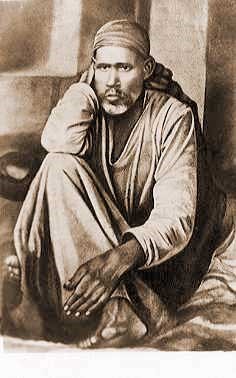
Sai Baba

Sai Baba
Baba commented later:
I then felt drawn to walk to the nearby temple of Khandoba in which (Upasni) Maharaj was staying in seclusion. When I came near enough to him, Maharaj greeted me, so to speak, with a stone he threw at me with great force. It struck me on my forehead exactly where Babajan had kissed me, hitting with such force that it drew blood. The mark of that injury is still on my forehead. But that blow from Maharaj was the stroke of dnyan (Marefat of Haqiqat or divine knowledge)
In 1916 Merwan took up a managerial assignment with a theatrical company on his mother's insistence to take up a job; but the company closed shutters two months later and Merwan too took over charge of his father's tea shop. He suffered intense spiritual agony and had a compulsive desire to do lowly work. He opened up a toddy shop in partnership with Buasahib, his friend and later on his disciple. Merwan worked for nearly eighteen hours each day in the toddy shop where he cleaned bottles, served customers and even swept the floor. On this phase Baba commented:
That was the beginning of my present infinite suffering in illusion which I experienced simultaneously with my infinite bliss in reality. But it took me seven years of acute struggle under Maharaj’s active guidance to return completely to, and become established in, normal human consciousness of the illusion of duality, while yet experiencing continuously my super-consciousness
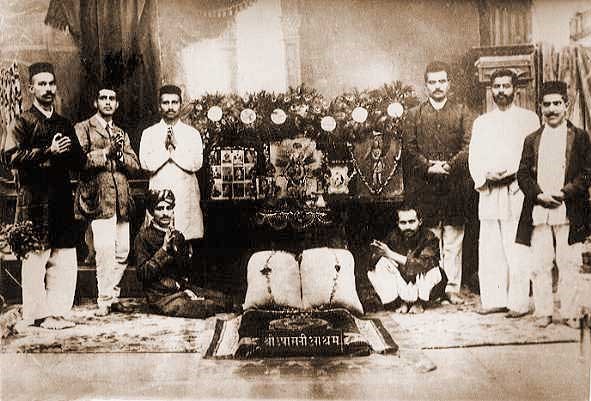
Merwan seated left, with his early companions

Merwan seated left, with his early companions
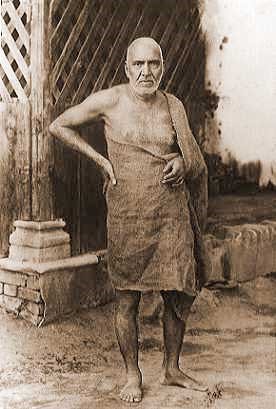
Upasni Maharaj

Upasni Maharaj
Merwan spent six months with Maharaj at Sakori from July to December 1921. “During those six months Maharaj and I used to sit near each other in a hut behind closed doors almost every night. On one such occasion, Maharaj folded his hands and said to me,
Merwan, you are the Avatar and I salute you
On another occasion, Maharaj told his disciples,
I have given my authority to Merwanji. He is the holder of my key
and later,
This boy will move the world. Humanity at large will be benefited at his hands
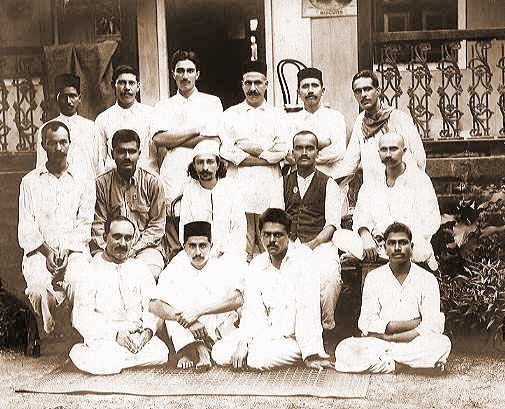
Meher Baba with his early disciples at Manzil-e-Meem in Bombay in 1922
